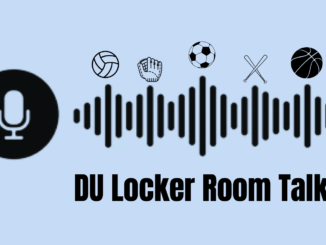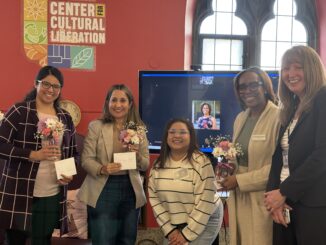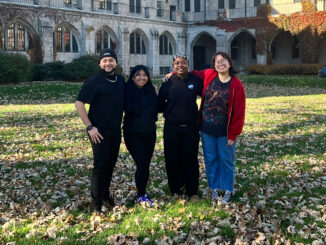
By Itzel Chavero
Undocumented students at Dominican are trying to make their ways while judges debate their futures and lawmakers in Washington look the other way.
Dominican advocates for undocumented students by helping them to create spaces on campus.
The creation of organizations such as the Undocumented Immigrant Allyance (UIA) build partnerships and promote the rights of undocumented immigrants.
The UIA is a social justice program working with undocumented students as well as DREAMERs and DACA recipients.
It creates partnerships in and out of Dominican, plans workshops, benefits DACA renewals, and hosts fundraisers to help members pay legal fees.
In 2022, there were approximately 580,000 active DACA recipients throughout the United States. DACA, officially known as the Deferred Action for Childhood Arrivals, began in June 2012.
It protects certain undocumented immigrants brought to the country as children and provides them with legal work permits and protection from deportation.
A few years later, Dominican officially declared itself a sanctuary campus. This meant that in the case that Immigration Customs & Enforcement (ICE) were to be held on campus, the university would protect undocumented students.
The UIA is the latest incarnation of immigrant advocacy at Dominican.
In the early 2000s, the Organization of Latin American Students (OLA) did a great deal of work on immigration issues.
During the early Trump era, the Dominican Immigrant Student Collective (DISC) responded to various xenophobic moves by protesting.
Yessenia Hernandez, a UIA advisor, stated DISC concentrated on student advocacy more than student support. It supports voters in nearby communities and advocates for laws protecting undocumented immigrants.
Junior Ingrid Bustos provides plenty of support for UIA.
Bustos is undocumented and does not have DACA. She strongly advocates for the rights of undocumented students and the immigrant community.
She stated that UIA puts on workshops with outside organizations to help students with vital paperwork like DACA renewals.
UIA hopes to continue these partnerships for other services such as filing for asylum and citizenship applications.
The group regularly brings in a lawyer, usually in the spring, to answer more in-depth questions and work with legal processes.
Hernandez, a Dominican alumna, also works as an undocumented student support coordinator and is the assistant director of the Center for Cultural Liberation.
She helps members navigate the supports Dominican offers to undocumented students as well as providing them with historical knowledge on the program.
During her undergraduate years, Hernandez served as a board member for the UIA. She explained how her knowledge of the organization helps her guide undocumented students to the right path.
“For us, it is more about bringing the resources to you all and understanding what is happening around,” said Hernandez. “It is also about understanding what is happening within Dominican.”
In September, the future of DACA seemed to be in jeopardy when a federal judge in Texas unlawfully ruled DACA and prohibited the enrollment for any new DACA applicants.
This ruling left the future of recent DACA applicants and those who were hoping to apply in the air with no idea if the program would open again.
Bustos explained that she had to apply for DACA but did not receive an acceptance or rejection due to the ruling.
“With everything that goes on in politics today, I have kind of lost hope myself towards DACA,” said Bustos. “I do hope that instead of just renewing DACA or legalizing it, they find a way to do something for undocumented immigrants around and give them a certain pathway for citizenship.”
Bustos is one of many other students who have undocumented family members.
She said she wants lawmakers not only to give her relieve, but also to help other undocumented families.
Cecilia Sandoval, a junior majoring in psychology, is a US citizen, but has undocumented relatives. One day, she said she wants her loved ones to have the same benefits as her.
“It is hard because I have close family members who have been in this country for so many years and have worked extremely hard and have done everything the right way,” said Sandoval. “They receive no support from a country they have given so much too. I am thankful for the opportunities I have, but I am saddened to see some of my relatives struggle and live in fear because of their legal status. It is truly a slap in the face.”
The UIA is not only open to undocumented students, but also to anyone who wants to learn or help.
The group holds regular events and fundraisers to maintain their emergency fund, such as a churro and concha sale for Día de los Muertos.
In the spring, the UIA will be hosting a “Coming out of the Shadows” showcase, where they will ask for student submissions and bring guest speakers to share their experiences being undocumented.



